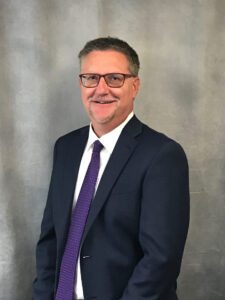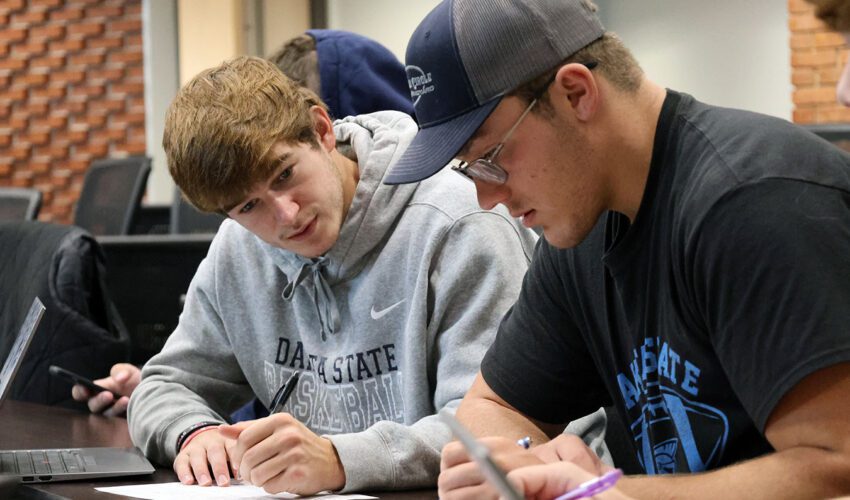Professional accountancy career path opens doors
Jan. 10, 2024
This paid piece is sponsored by Dakota State University.
The term “professional accountancy” may invoke images of a future in bookkeeping or doing taxes, but the career paths with a professional accountancy degree are anything but limited. Graduates can find positions as data analysts, project accountants or C-suite administrators.
“It’s a versatile degree that can open doors into career paths that you may have more interest in, so don’t get caught up in the name,” said Dakota State University alum Marcus VandenBosch.
He earned a degree in professional accountancy in 2022, which includes the required 150 semester hours of college credit to take the Certified Professional Accountant certification test in South Dakota. Earning the professional accountancy degree and CPA designation has allowed VandenBosch to learn to do tax returns and work with CPAs on them.
“Some of the biggest benefits are being able to understand financial statements fully, do my own taxes and budget for the real world,” he said.
VandenBosch built on that coursework and now works as a Python developer for Kiewit Construction. While earning his professional accountancy degree, VandenBosch used elective credits to learn how to code.
“Professor Andrew Behrens helped introduce me to Python programming, which was a huge help for my current career,” he said.
Andrew Behrens
The degree program also helped him as a student-athlete.
“My DSU education taught me time and workload management,” he explained. “Balancing work and school while having a personal life has made the transition to full-time work quite easy. Challenges from professors and coaches gave me the experience to start my career with ease.”
One of those professors, Scott Morstad, was VandenBosch’s adviser and was critical in guiding him through the accounting courses, VandenBosch said.
Scott Morstad
Morstad, a CPA and licensed attorney, is in his seventh year teaching accounting and business law classes in the College of Business & Information Systems undergraduate and graduate programs.
“It’s a rewarding career that includes being a part of a team and sharing the story about what’s happened in the company,” Morstad said of being a CPA.
Morstad explained that CPAs have higher starting wages in the accounting industry, are more likely to be promoted to chief financial and executive officers and often are recognized in and out of the industry as more well-rounded accountants.
“The CPA role is established because of the rigor of the education, the rigor of the exam itself and the professional ethics standards that CPAs are bound to,” Morstad said.
Non-CPA accountants often work in departments such as payroll, financial reporting or treasury at companies, he added.
2024 CPA exam changes
In January, the current Uniform CPA Examination will change. There will be three core sections: auditing and attestation (AUD), financial accounting and reporting (FAR), and taxation and regulation (REG), Morstad said. A fourth section will allow students to choose a discipline in which to be tested: business analysis and reporting, information systems and control, or tax compliance and planning.
This change is meant to isolate students’ talents, Morstad explained. “If you have a student taking the CPA exam and they really excel at business analytics, this gives them the opportunity to showcase that.”
According to Morstad, other changes are being made to the exam to better prepare students for the real world. To ensure students are ready for these changes, DSU established a CPA evolution committee that compared the professional accountancy curriculum to the learning objectives for the new exam.
“The committee recommended new classes that we’re going to offer, including tax compliance and planning, and data analytics for accountants,” Morstad said.
All three core sections and specific disciplines indicate that accountants need to serve as data analysts, which inspired the addition of the data analytics class.
“Accountants need to tell a story about the financial statements and the conditions of companies and their financial ability and wellness, and we can use data analytics to do that,” Morstad explained.
Morstad stays updated on industry standards through his involvement with professional organizations such as the American Institute of Certified Public Accountants, the Academy of Legal Studies in Business, the American Accounting Association and the South Dakota Society of CPAs.
In addition to the professional accountancy degree, DSU offers a bachelor’s of business administration with specializations in accounting, business technology, finance, management and marketing. These programs are accredited by the Accreditation Council for Business Schools and Programs.
For information about the professional accountancy degree, visit dsu.edu.











